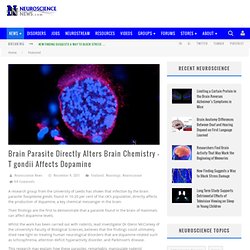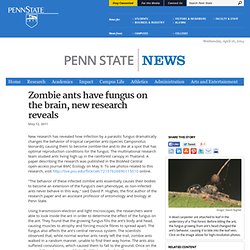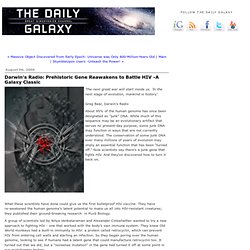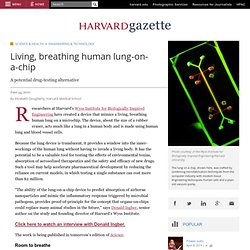

Brain Parasite Directly Alters Brain Chemistry – T gondii Affects Dopamine. A research group from the University of Leeds has shown that infection by the brain parasite Toxoplasma gondii, found in 10-20 per cent of the UK’s population, directly affects the production of dopamine, a key chemical messenger in the brain.

Their findings are the first to demonstrate that a parasite found in the brain of mammals can affect dopamine levels. Whilst the work has been carried out with rodents, lead investigator Dr Glenn McConkey of the University’s Faculty of Biological Sciences, believes that the findings could ultimately shed new light on treating human neurological disorders that are dopamine-related such as schizophrenia, attention deficit hyperactivity disorder, and Parkinson’s disease. This research may explain how these parasites, remarkably, manipulate rodents’ behaviour for their own advantage. Dopamine is a natural chemical which relays messages in the brain controlling aspects of movement, cognition and behaviour.
Notes about this brain research article. Woolly Mammoth Resurrection, "Jurassic Park" Planned. At the end of the last ice age, about 10,000 years ago, woolly mammoths dwindled to extinction as warming weather diminished their food sources, most scientists believe.

There are believed to be ten million mammoths buried in permanently frozen soil in Siberia. Because of the sparse human population in the region, though, only about a hundred specimens have been discovered, including two dozen complete skeletons. Zombie ants have fungus on the brain, new research reveals. New research has revealed how infection by a parasitic fungus dramatically changes the behavior of tropical carpenter ants (species Camponotus leonardi), causing them to become zombie-like and to die at a spot that has optimal reproduction conditions for the fungus.

The multinational research team studied ants living high up in the rainforest canopy in Thailand. A paper describing the research was published in the BioMed Central open-access journal BMC Ecology on May 9. To see photos related to this research, visit online. "The behavior of these infected zombie ants essentially causes their bodies to become an extension of the fungus's own phenotype, as non-infected ants never behave in this way," said David P. A New, Somewhat Moldy Branch On The Tree Of Life. Hide captionTwo cells — one marked mostly in green, the other in blue — of a newly discovered organism found in water samples collected from the University of Exeter pond.

Scientists think these "cryptomycota" use their tails to propel themselves while searching for food. Meredith Jones/Nature If you think biologists have a pretty good idea about what lives on the Earth, think again. Scientists say they have just now discovered an entirely new branch on the tree of life. It's made up of mysterious microscopic organisms. This comes as a big surprise. "We thought we knew what about the major groups that existed," says James, who is curator of fungus at the University of Michigan. Many fungi are already familiar. Biologists figure they've probably only cataloged about 10 percent of all fungal species. Oops. Darwin's Radio: Prehistoric Gene Reawakens to Battle HIV -A Galaxy Classic. What these scientists have done could give us the first bulletproof HIV vaccine.

They have re-awakened the human genome's latent potential to make us all into HIV-resistant creatures; they published their ground-breaking research in PLoS Biology. A group of scientists led by Nitya Venkataraman and Alexander Colewhether wanted to try a new approach to fighting HIV - one that worked with the body's own immune system. They knew Old World monkeys had a built-in immunity to HIV: a protein called retrocyclin, which can prevent HIV from entering cell walls and starting an infection. So they began poring over the human genome, looking to see if humans had a latent gene that could manufacture retrocyclin too. It turned out that we did, but a "nonsense mutation" in the gene had turned it off at some point in our evolutionary history. We are what we eat : Article : EMBO reports. What children’s skulls look like as they prepare to lose their baby teeth. Why Grandad is making our babies ill - Times Online.
Human Zoo Poster. Into the abyss: The diving suit that turns men into fish - Science, News. The invention of scuba diving has allowed us to breathe underwater but only at very shallow depths.

Thanks to our inability to conquer the bends, diving below 70m still remains astonishingly dangerous to anyone but a handful of experts. Ultra-deep diving is so lethal that more people have walked on the moon than descended below 240m using scuba gear. Now an inventor in the United States believes he has solved the riddle of how to get humans down to serious depths – by getting us to breathe liquid like fish.
Arnold Lande, a retired American heart and lung surgeon, has patented a scuba suit that would allow a human to breathe “liquid air”, a special solution that has been highly enriched with oxygen molecules. Living, breathing human lung-on-a-chip. Photo courtesy of the Wyss Institute for Biologically Inspired Engineering/Harvard University The lung on a chip, shown here, was crafted by combining microfabrication techniques from the computer industry with modern tissue engineering techniques, human cells and a plain old vacuum pump.

Researchers at Harvard’s Wyss Institute for Biologically Inspired Engineering have created a device that mimics a living, breathing human lung on a microchip.